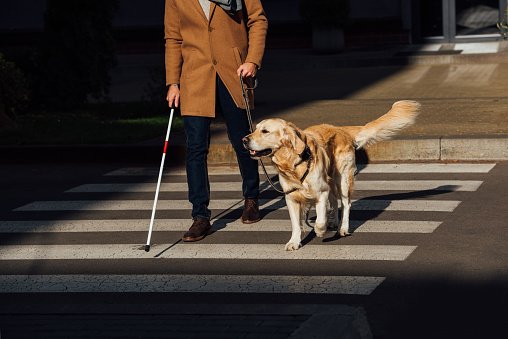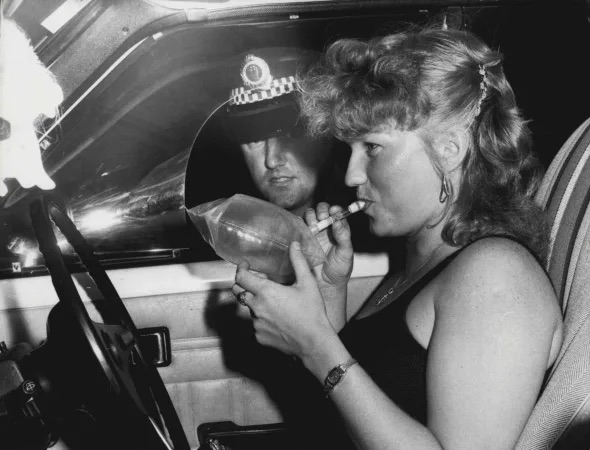For many years I kept a secret. The ‘thing’ that led to the secret started in my childhood. My parents brushed it off as clumsiness. I bumped into walls, doors, furniture ,,. Outside it was worse. I bumped into signs, fell into holes and tripped over constantly. Mealtimes often ended badly because I’d spill my drink or knock something off the table and break it. At school no one wanted me on their team because I was hopeless at ball sports. I couldn’t hit them, catch them or even chase them. Academically I wasn’t too bad but I had to put the effort in. I did a lot of reading and re-reading because lots of things just didn’t make sense. They don’t if you miss whole sentences.
The optometrist
Years later my friend Jeanette suggested there was a reason for my clumsiness. She knew a lot about eyesight problems and worked for an optometrist. Two days later I had an eye examination. The optometrist did the usual tests followed by a test for colour blindness. Then he got out his special light which allowed him to look directly into my fundus. ‘Mmmm, interesting’, he commented as his beard tickled my face. He asked my permission to be examined by the other optometrists in the firm. Rick, Jen and Tom came in to have a look and made comments like ‘never seen that before, what is it?, fascinating, unusual, different ……’
Then the ophthalmologist
I had to wait another two weeks for my appointment with the ophthalmologist. During that time, I lay awake at night thinking maybe ‘the thing’ was going to make me blind. I checked the referral letter. Nothing there. Nothing that I could understand anyway. Perusing medical dictionaries, encyclopaedias and books on eye diseases at the library filled the spare seconds during those pre- Google days. I read up on all the opias – hemeralopia, nyctalopia, amblyopia, myopia, hyperopia. Nothing there. I looked a bit further. Cataracts, astigmatism, macular degeneration, glaucoma, cancer …
You will go blind
Finally ‘ophthalmologist day’ arrived. After all the usual eye examinations, I had a short consultation with the ophthalmologist. He looked into the back of my eyes with his special tool. “Annette, you have Retinitis Pigmentosa’, he announced in a slow serious voice.
He continued, ‘you will go blind. There is a grieving process, same as for cancer or any other disease’. The words ‘disease’ and ‘cancer’ kept flashing through my mind. The mention of cancer helped me to regain my composure and walk out of the clinic unaided. I had already experienced suffering and death in my family due to cancer. I was thankful I didn’t have cancer.
What is Retinitis Pigmentosa (RP)?
RP is a genetic disease that causes irreversible vision loss. The cells in the retina called the photoreceptors don’t work properly causing a gradual loss of sight. The onset of symptoms usually begins in childhood. The degeneration in the peripheral vision occurs first before gradually extending to a decline in the central visual field. Colour vision, visual acuity and night blindness are all compromised.
How I felt
Angry. Scared Alone. No one seemed to understand what I was going through. How can you explain why you can see a bird in the sky but you can’t see the pencil in front of you? By ignoring it, the ‘thing’ didn’t go away. But I decided to keep it to myself. It was easier than trying to explain myself to others who didn’t understand, didn’t care or quickly forgot about ‘the thing’ that caused me so much internal grief. In their eyes, pre and post diagnosis I hadn’t changed.
The effect on my children
My diagnosis was very difficult for my children. I was certainly aware how my youngest felt. At the age of seven, she announced, ‘we haven’t got a father. we haven’t got a grandfather. We haven’t got a car. And you’re not blind’. And she sobbed. It was heartbreaking. I felt their grief too. And on top of that, the guilt. As a single parent of three little ones my children had to pick up the pieces after each low vision episode.
The broken bones, the bruises, sprained ankles, stabbed foot, the head injury, the broken teeth ….. The injuries that were caused by walking into space at the top of a staircase twice, knocking a knife off a bench, walking into walls, potholes, signs, missing the bottom step on a bus, falling over a giant rock, a small piece of concrete, head butting an invisible steel gate ….
Being secretive was ruining my life
It took another twenty plus years before suddenly I didn’t want to do low vision by myself anymore. Being secretive about RP was ruining my life, not the disease itself. I thought if I kept it a secret I would be exempt from discrimination. But I experienced discrimination anyway. My first experience of workplace harassment was directly attributable to my ‘unique qualities’ that are intrinsic to RP. Another incident occurred when I was transferred against my will to a work site that had no suitable access to public transport although it was common knowledge that I didn’t have a drivers’ licence.
Eventually the workplace became unbearable so I made a complaint to the Industrial Relations Commission. I was unable to attend the hearing because the events leading to that report had caused my general health to deteriorate. After that I never went back to work in my home state of Tasmania again. Instead I moved to Melbourne.
So this is me! I have RP!
I joined an online RP Support Group. Sifting through hundreds of posts was like reading about me. Firstly, how difficult it is for ‘unexceptional’ people to comprehend vision loss that compromises daily functioning. Secondly, the stages between low vision and blindness present enormous challenges that are often misunderstood in the mainstream. Consequently, individuals experiencing low vision often encounter social exclusion, discrimination and hostility. Suddenly I wanted to create awareness and attitudinal change towards people with low vision.
Inspiration for a Churchill Fellowship
Early in 2018, I applied for a Churchill Fellowship to investigate the challenges of low vision in order to promote a more inclusive society. A Churchill Fellowship enables successful applicants the opportunity to go overseas to research a topic that they are passionate about and that they have already researched exhaustively in Australia. The field of research must be beneficial to Australians.
Research
My research included written surveys, interviews, reading research articles and creating questionnaires online. I joined a Vision Australia support group, a Telelink group for people with low vision and Blind Citizens of Australia (BCA). My research showed that individuals with low vision feel they are misunderstood. Depression due to negative public perception is common. My aspiration was to promote attitudinal change by raising awareness through education with the result that all people with low vision will feel supported and connected.
I did get an interview but didn’t receive a Fellowship. After months of preparation, research followed by the high-pressured interview, I didn’t want to abandon my goal. Accepting and creating opportunities to write and talk about my topic enables me to continue what I set out to do – create awareness about low vision, in particular RP.
The blog
I also started writing this blog during the pandemic initially as a diary for my baby grandchildren. As well as stories based on the latest news and personal stories, I have been using the platform to write some articles about vision loss.
The link
Here is the link to my article and podcast – https://www.bca.org.au/2020/11/09/the-secret/
Image:https://pixabay.com/images/search/blindness/




